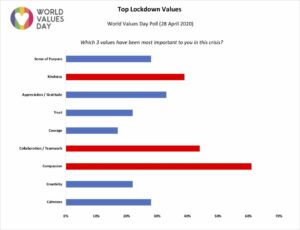by Graham Boyd, Founder & CEO, Evolutesix
Everything you say or do comes out of your meaning-making stories. All of your behaviours. These meaning-making stories are how you answer the questions “What does this mean, and therefore who should I do what for?”
If people’s behaviour; your own, your colleagues, or a nation’s collective behaviour; is not delivering helpful outcomes, it’s the meaning-making stories that need to be changed. New rules, new regulations, or new values framed and hung on the wall are only going to increase the problems.
The stories writing your behaviour have two sides to them: your aspirations, and your vulnerabilities. Buried deep in these stories are your values. The actual values that write your behaviour. Many of these are hidden from you, so before you can begin rewriting your stories, you first need to find out what they are.
Your behaviour is written by partly by uniquely personal stories you have written alone, shaped by your experiences and the meaning you made of them at the time, and partly by the collective stories, or culture, of the groups you belong to. For example, your country and your company.
These stories are far stronger than any laws, rules or policies at shaping behaviour. Especially if the stories tell you that rules are to be broken, systems are to be gamed, and authority is to be resisted. (Of course, sometimes your stories include stories telling you that always doing what authority says is the way to behave. That authority always knows better. Then, and only then, are rules effective at shaping your behaviour.)
Deep inside these stories are three elements: values, meanings, and consequences.
- What you believe is important, or valuable, or that you need.
- What it means if these needs and values are satisfied, or unsatisfied.
- What the best-case or worst-case consequences are.
For example, maybe fairness is one of your top values. Perhaps your stories include one that that most people are inherently out for themselves, will treat you unfairly if they benefit, and so you must have enough power to force them to treat you fairly. If you don’t have that power, you will be treated unfairly, and then you will step by step be pushed into the gutter until you are cold, starving and alone.
So at the slightest warning of potential unfairness you react with all the power you have. Becoming a power-seeking manager. Quite likely ending up creating unfairness around you.
Over time you may notice that paradox. You may feel the paradox between your actual behaviour and the deepest values you have; or you may see the outcomes your behaviour (or that of your colleagues, family, or friends) leads to are unhelpful.
Avoid at all costs the natural temptation to use force on yourself or others. Never simply make a resolution to behave differently, never just put in new rules or regulations, new rewards and punishments. If the collective and individual meaning-making stories remain the same, all you will get is an increase in stress as your stories do battle with the rules to control your behaviour.
The stories are old, powerful, and many are deeply hidden. They will win these battles when it matters. And you don’t know what many of them are.
Find out what they are. Look at your actual behaviour. Look at the fleeting thoughts and feelings you have, in the instant you choose one action over another. Use these as clues to help you uncover ever deeper layers of your meaning-making stories. Inside these are the actual values that write your behaviour.
When values programmes in companies fail, when your attempts to improve yourself fail, it’s not because you are weak. It’s not because you are bad. Feeling ashamed, blaming yourself or others is inappropriate and harmful. It’s because hidden deep inside you, or the organisation’s (or nation’s) culture is a meaning-making story telling you what is happening, what it means, and what you must do.
Only when that story has been rewritten will behaviour change.
That story gets rewritten by new experiences that you create for yourself, not by thinking or talking.
So uncover your deepest meaning-making stories, and then create your classroom of experiences that will rewrite them. Most of all, be patient and compassionate with yourself.
You can read more in the forthcoming book “Picasso and Einstein: The economy, leadership and you”. A draft version is available for download here: https://www.picasso-einstein-economy-leadership-you.com
ABOUT THE AUTHOR:

www.theheadshotguy.co.uk
07768 401009
“Dr. Graham founded Evolutesix after three careers: as a theoretical particle physicist, a manager with Procter and Gamble, and as a serial startup founder. Evolutesix incubates and invests in startups using the full adaptive organisation approach, and consults/coaches companies like Rockwool, civil servants in the UK and EU commission, and consultancies like Issoria, Xpreneurs etc”







